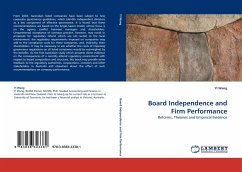
Board Independence and Firm Performance
Reforms, Theories and Empirical Evidence
Versandkostenfrei!
Versandfertig in 6-10 Tagen
52,99 €
inkl. MwSt.

PAYBACK Punkte
26 °P sammeln!
From 2003, Australian listed companies have been subject to new corporate governance guidelines, which identify independent directors as a key component of effective governance. It is found that these recommendations are based on the Anglo-Saxon model, whose focus is on the agency conflict between managers and shareholders. Unquestioned acceptance of overseas practice, however, may result in proposals for regulatory reform which are not suited to the local environment; the regulatory requirements imposed on companies may add to the compliance costs for these companies, and, indirectly, their s...
From 2003, Australian listed companies have been subject to new corporate governance guidelines, which identify independent directors as a key component of effective governance. It is found that these recommendations are based on the Anglo-Saxon model, whose focus is on the agency conflict between managers and shareholders. Unquestioned acceptance of overseas practice, however, may result in proposals for regulatory reform which are not suited to the local environment; the regulatory requirements imposed on companies may add to the compliance costs for these companies, and, indirectly, their shareholders. It may be necessary to ask whether the costs of imposing governance regulations on all listed companies would be outweighed by the benefits. As the first Australian study which presents direct evidence on the consequences of a recently altered regulatory environment with respect to board composition and structure, this book may provide some feedback to the regulatory authorities, corporations, investors and other stakeholders in Australia and elsewhere about the effect of such recommendations on company performance.












